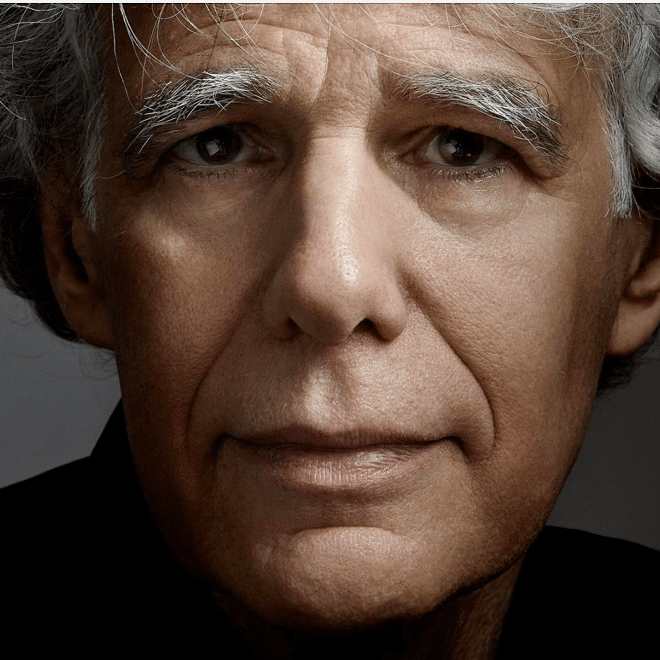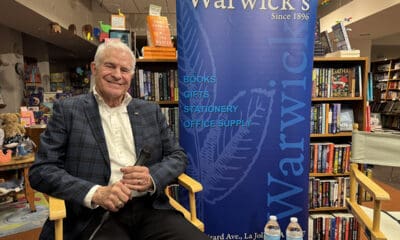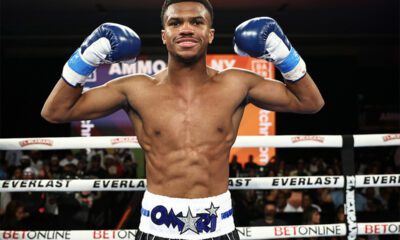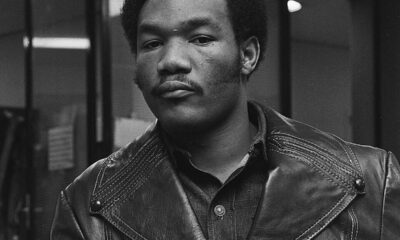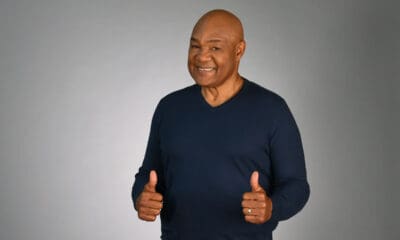It may seem that Thomas Hauser has always been consumed with boxing, every hour of every day. That’s not the reality, though. Really.
In a wide-ranging email interview, from 2014, Hauser reveals how his decades-long fascination with the sport began, some unforgettable moments along the way as a chronicler of the sweet science and opinions on a number of topics, including Mike Tyson’s challenges as a promoter.
Hauser, who has has completed more than 20 published books on boxing, received the Boxing Writers Association of America’s Nat Fleischer Award in 2004, an annual honor that recognizes excellence in boxing journalism.
In 1991, Hauser’s “Muhammad Ali: His Life and Times” was selected as the William Hill Sports Book of the Year award, an annual British honor for sports literature
* * *
Ed Odeven: Can you pinpoint a moment or a memory that sparked your desire to write about boxing?
Thomas Hauser: In 1983, I had just finished writing a novel about Beethoven and wanted to write a book about sports. At that point in time, my favorite sports were baseball and football. You can’t just walk into Yankee Stadium and talk with the New York Yankees. But you can walk into a gym in any city in the world and talk with fighters who are training there. So I wrote a book about the sport and business of boxing entitled “The Black Lights.” And I got hooked. Everything else flowed from there.
What’s the best thing professional boxing has going for it today? And what do you consider its biggest problem?
The best thing boxing has going for it is the nature of the sport. At its best, boxing is the greatest sport of all. The biggest problems it has are (1) multiple champions in each weight division; (2) the lack of an effective oversight body that cares about the sport; and (3) an economic model that cuts fans off from the biggest events.
Thomas Hauser Shares A Treasured Ali Story
EO: Of all the stories in books and articles about Muhammad Ali, all of the fights, all of the quotes from him and about him, are there a few favorite that you love repeating or simply find yourself amused by whenever you think about them?
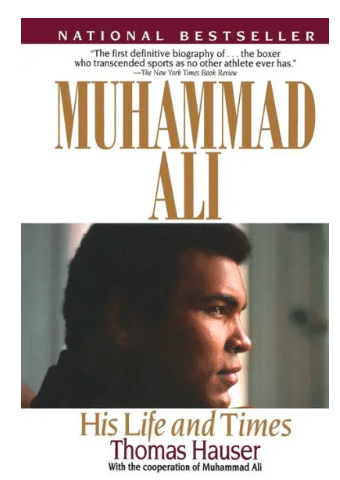
TH: When Ali was in his glory years, he took a shuttle flight from Washington, D.C. to New York. As the flight crew readied for take-off, an attendant instructed, “Mr. Ali, please buckle your seat belt.”
“Superman don’t need no seat belt,” Ali informed her.
“Mr. Ali,” the flight attendant said sweetly, “Superman don’t need no plane.”
Ali loves that story, and I do, too.
EO: For the casual observer of boxing or someone who hasn’t read dozens of books on the sport, who are some of the living, under-appreciated sources of knowledge about the sweet science’s ins and outs and rich history? Can you shed some light on the important role they serve for your own research and helping to, well, make sense of it all?
Thomas Hauser: I’ve learned an enormous amount over the years by talking with people in the trenches. People like Bruce Trampler, Al Bernstein, Lou DiBella, Don Elbaum, Pat English, Steve Farhood, Brad Goodman, Margaret Goodman, Craig Hamilton, Jerry Izenberg, Ron Katz, Russell Peltz, Don Turner. That’s just a few of the people I’ve learned from over the years.
EO: If Congress in the near future were to establish a governing body to regulate boxing – and maybe mixed martial arts as well – could you recommend a person or two who would be at the top of the list as ideal candidates?
TH: Flip Homansky, Pat English.
Weighing In On Mike Tyson
EO: How would you evaluate Mike Tyson’s business acumen and the work he’s done so far as a boxing promoter?
TH: Mike is not a businessman. His success or failure as a promoter will rest almost entirely on the people he chooses to run the business for him.
EO: Who do you consider the most unheralded, or perhaps underrated, trainer of the past 50 fighters? And what accomplishment(s) he’s had have received modest publicity compared to other boxing headlines?
Thomas Hauser: I don’t think that there are any unheralded geniuses out there. To the contrary, I think some “name” trainers get far more credit than they deserve. The fighters make the trainer more than the other way around. But I do think that trainers who did a great job with one fighter (e.g. Pat Burns with Jermain Taylor, Jack Loew with Kelly Pavlik, Brian McIntyre and Esau Diegez with Terence Crawford) should get a little more credit for their work.
EO: Interviews with boxers after a title bout have their own challenges. From your own experience, at the most basic level, what are the keys to getting an effective interview after the bout, especially when the stakes are highest?
TH: It helps if you’ve had a rapport with the fighter before the fight. Other than that, ask creative questions, don’t start the interview with a pre-conceived notion of where it should go, and remember that the answer is more important than the question.
EO: If you were to rank your work, especially columns, articles and books, could you decide on five that would be at the top based on quality and how they stand the test of time?
Thomas Hauser Summarizes Own Work
TH: I’ve been fortunate in that, each year, the University of Arkansas Press publishes a book that contains all of the articles I’ve written about boxing during the previous year. That preserves the columns for history.
I’d say that my work falls into three categories:
(1) Chronicling the contemporary boxing scene — “The Black Lights” and University of Arkansas Press books;
(2) Two novels — “Waiting For Carver Boyd” and “Mark Twain Remembers” (which has a boxing sub-plot); and
(3) My writing about Muhammad Ali
EO: What compliment(s) about your boxing coverage have you most appreciated over the years? And if you can recall the context of how and when you received the compliment, please share those details.
TH: The thing that I most appreciate is when fighters tell me that they like my writing. It’s particularly gratifying when a fighter invites me into his dressing room to chronicle the hours before and after a fight.
EO: For your own leisure reading and continued education, who are three or four boxing writers you consider must reads? And what stands out about their work?
Who Does Thomas Hauser Like To Read?
TH: Bart Barry, Carlos Acevedo and Jimmy Tobin are Internet columnists — all three are relatively unknown. But they write very well and understand both the sport and business of boxing.
EO: What’s been your most challenging column to write? Why?
TH: I’d say that the investigative articles that I’ve written over the years about the New York State Athletic Commission, HBO, Shelly Finkel, and Al Haymon have been the most challenging to write and also the most rewarding.
EO: Which of your boxing books was the most difficult to write? Why?
Thomas Hauser: “Muhammad Ali: His Life And Times” because there was so much archival research involved and 200 people to interview. But I don’t think I’ll ever have a work project that brings me as much joy in the undertaking.
EO: Can you provide an update on what your next book will be about? Will it be about boxing? And when will it be released?
Boxing Took Back Seat To Dickens
TH: My next book has nothing to do with boxing. It’s a novel about Charles Dickens entitled “The Final Recollections of Charles Dickens” that will be published by Counterpoint in November.
I think that “The Final Recollections of Charles Dickens” and “Mark Twain Remembers” (a novel I wrote 15 years ago) are the two best books I’ve written.
EO: Word association time – what first comes to mind as the right word or a few descriptive words for … ?
TH: Don King – Brilliant, charismatic, conniving
Bob Arum – Smart, manipulative, complex
Larry Holmes – champion
Larry Merchant – thoughtful
Oscar De La Hoya – unhappy
Bernard Hopkins – intense
Wladimir Klitschko – intelligent, powerful, PEDs
Vitali Klitschko – commitment, nobility, strength
Manny Pacquiao – Filipino people
Floyd Mayweather Jr. — Gifted, phony










